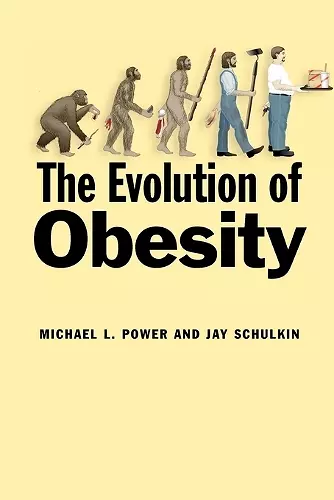The Evolution of Obesity
Jay Schulkin author Michael L Power author
Format:Paperback
Publisher:Johns Hopkins University Press
Published:22nd Feb '13
Currently unavailable, and unfortunately no date known when it will be back
This paperback is available in another edition too:
- Hardback£37.50(9780801892622)

Compelling, well written, and brimming with fascinating facts and observations. With its broadly comparative perspective and holistic focus, this is an important and unique contribution to the obesity literature that challenges conventional assumptions about the disease and its origins. -- Chris Kuzawa, Northwestern University
Draws on popular examples and sound science to explain our expanding waistlines and to discuss the consequences of being overweight for different demographic groups. This title reviews the various studies of human and animal fat use and storage, including those that examine fat deposition and metabolism in men and women.In this sweeping exploration of the relatively recent obesity epidemic, Michael L. Power and Jay Schulkin probe evolutionary biology, history, physiology, and medical science to uncover the causes of our growing girth. The unexpected answer? Our own evolutionary success. For most of the past few million years, our evolutionary ancestors' survival depended on being able to consume as much as possible when food was available and to store the excess energy for periods when it was scarce. In the developed world today, high-calorie foods are readily obtainable, yet the propensity to store fat is part of our species' heritage, leaving an increasing number of the world's people vulnerable to obesity. In an environment of abundant food, we are anatomically, physiologically, metabolically, and behaviorally programmed in a way that makes it difficult for us to avoid gaining weight. Power and Schulkin's engagingly argued book draws on popular examples and sound science to explain our expanding waistlines and to discuss the consequences of being overweight for different demographic groups. They review the various studies of human and animal fat use and storage, including those that examine fat deposition and metabolism in men and women; chronicle cultural differences in food procurement, preparation, and consumption; and consider the influence of sedentary occupations and lifestyles. A compelling and comprehensive examination of the causes and consequences of the obesity epidemic, The Evolution of Obesity offers fascinating insights into the question, Why are we getting fatter?
Michael L. Power and Jay Schulkin take a frankly Darwinian approach... The evolutionary account of obesity is a powerful one-indeed, almost too powerful. -- Elizabeth Colbert New Yorker Elbowing the weight-loss guides on 'health' bookshelves, is a spate of new, more diet-neutral books that track the sociology of obesity, including... The Evolution of Obesity. -- Mandy Katz New York Times Goes far beyond anything else that is available on obesity... Power and Schulkin deserve much credit for their bold attempt to combine evolutionary and reductionist explanations, and for their unflinching acknowledgment of complexity. Nature An excellent and comprehensive explanation for the increased incidence of obesity... Power and Schulkin suggest that there is a mismatch between our evolved biology and our modern life-the advantages of fat storage in the past have become disadvantages today... This informative and easily read book is an important companion for students, fellows, and clinicians who wish to understand the causes of the obesity epidemic and how obesity might lead to metabolic disease. New England Journal of Medicine This will be an extremely useful introduction for graduate and undergraduate students and for mainstream researchers to set the wealth of endocrine and metabolic data connected with obesity into a wider framework of understanding. -- John Speakman Trends in Endocrinology and Metabolism Power and Schulkin look for the origins of obesity in our evolutionary past... They stress the complexity of obesity's origin and caution against simplistic solutions, especially biomedical therapies for obesity that often have unintended adverse effects. Their goal is to elucidate the biological roots of weight gain, not make policy recommendations. -- Nicholas Freudenberg Lancet Power and Schulkin argue that our present-day obesity crisis is the consequence of a 'mismatch' between our biology and the environment in which we live... It is in the detail of its explanation that their study excels. -- Wendy Mitchinson, Ph.D. Journal of the History of Medicine and Allied Sciences While obesity may lead to pathology, and even be viewed as pathology, its biological underpinnings likely helped enable human evolution, say Power, a nutrition and metabolism researcher at the Smithsonian National Zoological Park, and Schulkin, a behavioral neuroscientist with the American College of Obstetricians and Gynecologists. -- Lynne Lamberg Wilson Quarterly A well written and scholarly tome with many fascinating observations and findings that highlight the many biological challenges to effective weight control in a modern society with a very efficient food delivery system. The breadth of scholarship is impressive and well documents in detail why humans are becoming obese. -- Randall C. Flanery PsycCRITIQUES
ISBN: 9781421409603
Dimensions: 229mm x 152mm x 25mm
Weight: 567g
408 pages